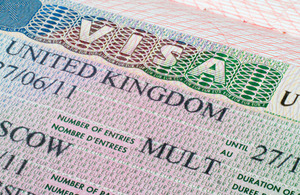Centre's client with pre-settled status unable to apply for destitute domestic violence concession
Central England Law Centre announced last week that is has sought permission to apply for judicial review of the current destitute domestic violence concession (DDVC) rules and the rules on indefinite leave to remain as a victim of domestic violence in the Immigration Rules (DVILR).
 Image credit: UK GovernmentThe law centre's client, known as GN, was left destitute as a result of suffering domestic violence. GN is unable to make an application under the DDVC or DVILR rules because she only has pre-settled status under the EU Settlement Scheme.
Image credit: UK GovernmentThe law centre's client, known as GN, was left destitute as a result of suffering domestic violence. GN is unable to make an application under the DDVC or DVILR rules because she only has pre-settled status under the EU Settlement Scheme.
Central England Law Centre says the legal challenge will argue that the difference in treatment for those unable to apply for the concessions amounts to discrimination contrary to Article 14 of the European Convention of Human Rights (ECHR).
The law centre said: "The DDVC would have granted GN leave to remain for three months and the ability to access essential services such as welfare benefits and housing assistance. Instead, GN was forced to rely on support from the local authority, leaving her destitute and living in hotels for several months."
Last month, the Court of Appeal ruled in the case of SWP v Secretary of State for the Home Department [2023] EWCA Civ 439 that limitations on domestic violence protections in the Immigration Rules were justified and DDVC rules were compatible with Article 14 of the ECHR, read with Article 8.
The Legal Feminist blog took a detailed look at the case here.
With regard to the DDVC rules, Lord Justice Singh noted in dismissing SWP's appeal: "In my view, this is clearly an area where a wide margin of judgement should be afforded to the Government because it does concern general measures of economic or social strategy. In particular, there were difficult, sensitive and potentially polycentric' issues which the Government faced in negotiating the terms on which the UK withdrew from the EU."
The Court of Appeal noted in the judgment that there was some confusion as to who could apply due to "inaccurate and out of date" information in the Home Office's current caseworker guidance on DDVC, The guidance was published in 2018 and, as yet, has not been updated.
"It is highly regrettable, to say the least, that these inaccurate and out of date statements still appear in the only published guidance, including what Home Office staff are expected to apply when dealing with relevant applications. At the hearing we were informed that the Secretary of State intends to amend this guidance. I can only express the hope that these amendments to make it accurate and bring the policy up to date will be achieved as soon as possible in the interests of all concerned," Lord Justice Singh remarked.
With regard to the rules around DVILR, Legal Feminist highlighted that there is no DVILR route available for victims of domestic abuse whose abusers are not settled.
Legal Feminist says the Home Office's approach is unfortunate as it leaves many migrant women very vulnerable to domestic abuse.
"While some will be able simply to leave their abuser and go back to their home country, this is not always possible for women who are from countries where divorce is a social taboo, or where there are children involved. Bleakly illustrative of this is SWP's evidence that she could feel compelled to return to her abusive husband if her appeal failed, as she would not be able to afford to educate him in India by herself. There will be many women in similar situations weighing the merits of remaining with an abuser if they cannot remain in the UK if they leave him," the Legal Feminist blog post stated.